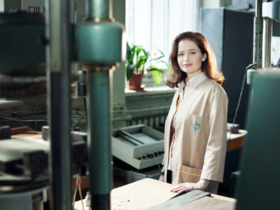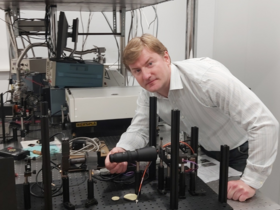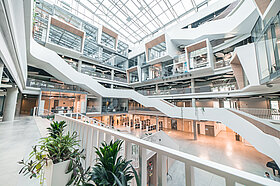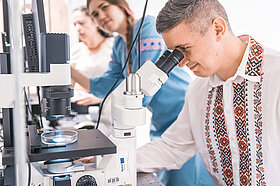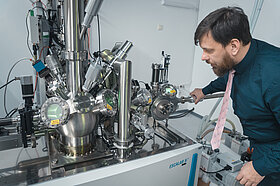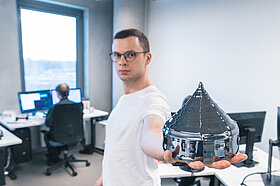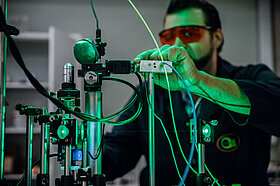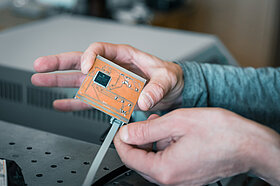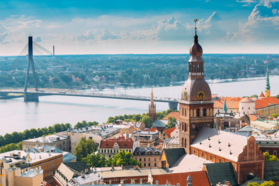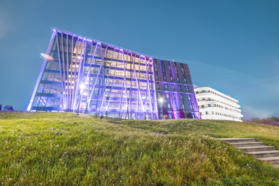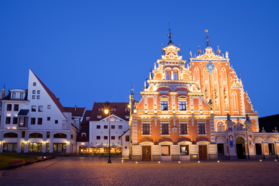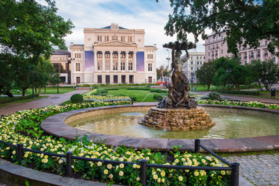Master's Degree in Physics at University of Latvia
Call for applications!
University of Latvia invites prospective students to submit applications for studies for the Master's programme "Physics" at the University of Latvia for Autumn intake 2024/2025:
-
Citizens of non-EU/EEA countries have to apply till 20.06.24.
-
EU/EEA/Swiss citizens have to apply till 23.07.24.
-
Citizens of Visa-free countries have to apply till 23.07.24.
-
Citizens of countries with additional assessment have to apply till 16.05.24.
EU/EEA/Swiss nationals may apply for budget places (25 in total)! To complete your admission successfully, please pay attention to application deadlines (above). For further information please contact Mrs. Darta Antane darta.antane@lu.lv
Research-Based Postgraduate Studies
The aim of the master's study programme “Physics” is to prepare highly qualified and internationally competitive master-level physics specialists for the labour market, providing an opportunity to specialise in sub-disciplines of physics specific to Latvia with high research and innovation potential and stimulating the acquisition of interdisciplinary competence during studies.
University of Latvia offers specializations in solid state and material physics, physics of continuous media, atomic, molecular and optical physics, theoretical physics as well as a list of interdisciplinary courses related to quantum computing, physical chemistry, etc. The postgraduate programme is organized in collaboration with Daugavpils University (located in Daugavpils, Latvia), which offers the specialization in technology physics.
Tuition | Admission | Requirements →
More information about the Postgraduate Study Programme and Plan →
A Word From Our Researchers
Already during study time most postgraduate students get involved in research projects and are employed by one of the research labs and institutes of the University of Latvia or innovative companies. After graduation, you can continue your academic growth in doctoral studies or immediately enter the labour market. Our graduates are in high demand for doctoral studies both at the University of Latvia and abroad.
Obtain master’s degree in Physics in collaboration with Laboratory of Organic Materials at Institute of Solid State Physics, University of Latvia, or in collaboration with Institute for Mechanics of Materials, University of Latvia.
Tatjana Glaskova-Kuzmina
Associate professor, leading researcher at Institute for Mechanics of Materials, University of Latvia
Break-through research at Institute for Mechanics of Materials
Research involves the nanotechnologies, multifunctional performance of polymer composites and 3D printing. Institute implements interesting applied research projects, for example, a company-commissioned study for developing fire-resistant materials for sport aviation. The materials to be created will be used to produce gliders, which have a high risk of explosion of lithium batteries. The use of fire-resistant materials can save the lives of pilots.
Applications
All of the material research subjects have real-life applications. Nanotechnologies enable the use of a smaller content of materials to achieve the desired physical properties. Multifunctionality is applied through self-heating, self-healing, and structural health monitoring for wind energy, aerospace and automotive applications. 3D printing is widely used, creating complex shapes and reducing polymer waste. There are some challenges and issues for each of these techniques, which provide a space for improvement and adjustment – the researchers respond to the actual needs.
Students collaborate with other researchers or institutions, both nationally and internationally
The students can collaborate with all partners involved in the jointly implemented or planned projects. The institute has a vast network of partners in and outside Europe, including Kaunas University of Technology (Kaunas, Lithuania), Lulea University of Technology (Lulea, Sweden), Patras University (Greece), Institute for Polymers, Composites and Biomaterials (Portici, Italy), Research Institute SYNPO (Pardubice, Czech Republic), Sport Aviation (Prienai, Lithuania), Baltic3D.eu (Latvia), Technical University of Denmark (Roskilde, Denmark), Norwegian University of Science and Technology (Gjøvik, Norway), and Drexel University (Philadelphia, USA).
Student employment, and the approximate salaries
The institute trains a select number of students, and plans to expand student involvement. The hourly rate for a Master's student is approx. 10 EUR/h, for a PhD student, it is higher and depends on the scientific metrics and the elected position (Assistant Researcher or Researcher).
Publishing research achievements and building career in research
There are extensive possibilities for presenting the results at national and international conferences. Since 2020, the Institute for Mechanics of Materials organizes annual “Advanced Composites and Applications” session within the international conference of the University of Latvia. Everybody whose interests are in the scope of the session topic can participate free of charge. A student-friendly conference, the “Baltic Polymer Symposium”, is widely attended by students from three Baltic countries and changes its location annually. If students significantly contribute to the research, they are involved in publications and presentations as authors or co-authors and attend conferences during their master’s studies and beyond.
Exchange opportunities
Staff mobility exchange within Erasmus+ and European RISE projects for mobilities/secondments. Students are considered early-stage researchers and can visit partner organizations for 1 month or more. They must arrange it with the academic staff to ensure the continuity of the study process.
Supportive environment
The students are supported, while ensuring that they have ample opportunities for self-guided research and hands-on practice. Research staff readily explain the methods and technicalities, as well as assist during the tests to ensure the correct procedure. Researchers are very flexible in their time management and work/plan to work when needed. Being at the institute is even more relaxed than at home. The atmosphere in the lab (especially during the weekend) is fantastic and allows to focus on urgent work.
The best employment opportunities
The best careers are achieved in research or relevant industries, with extensive opportunities for applied research.
Three things that best characterize research here
- New materials
- Practical applications
- Exciting results
Three reasons why choose the UL master’s programme “Physics”
- High quality education
- Safe and interesting living environment
- Good work prospects
Aivars Vembris
Associate professor, senior researcher, head of Laboratory of Organic Materials at Institute of Solid State Physics, University of Latvia
Break-through research carried out at Laboratory of Organic Materials, Institute of Solid State Physics
Research involves the functional organic materials, in some cases – combination with inorganic nanoparticles, creating hybrid structures. The investigated properties encompass optical, electrical, and thermal qualities. A particularly promising current direction – polymer photonics that includes quantum photonics.
Applications
The materials investigated by the research team have applications in solar cells, organic light emitting diodes, organic lasers, thermoelectric generators, as well as quantum communication.
Projects currently implemented at the lab
Laboratory coordinates Twinning project aimed at developing the ecosystem for quantum photonics in Latvia. The students can gain the experience
Opportunities for students to collaborate with other researchers or institutions, both nationally and internationally
The research team has strong collaboration with various groups in Europe, as well as worldwide. Every year, laboratory is involved in two international projects, and students participate in the project seminars.
How many students involved in the research at the lab, and the salaries
At present, ten local students – more than a half of the laboratory stuff, as well as international post-docs. Institute of Solid State has the specific salary system where salary depends on each performance.
Opportunities for professional development and employment during studies
Every student is welcome to launch their research career at the laboratory, introduced to the duties and trained by permanent staff, as well as other students. The preparation includes work instruction for various experimental equipment, learning the material deposition and investigation methods. The particular method depends on the chosen research direction. After training, student completes definite tasks. The student must complete the task in a certain time in a self-guided manner (it is not necessary to report on each step). As experience increases, the student is also expected to take initiative.
Postgraduate students in the research group can train and work as lecturers during their master’s studies.
Presenting research findings, such as conferences or publications, participation in meetings abroad, meeting foreign colleagues
Students who are involved in projects participate in international conferences, if the performance is excellent and all assigned tasks completed, obtaining presentable results.
Exchange programme opportunities for students in your research group as part of our master’s programme “Physics”
The laboratory has established cooperation and staff visits to University of Technology of Troyes, France and University of Trento, Italy. Students have continued their education also in Sweden.
Steps taken to ensure a supportive environment for students in your research group
Seminars are provided in English. Students in the laboratory support each other and suggest the best lectures and training, as well as work opportunities offered by the university.
Laboratory offers friendly and mutually supportive atmosphere – both regarding work environment and extracurricular matters.
The best employment opportunities of the former students of specialisation
The laboratory research concerns the top scientific fields with high application potential. Students gain expertise in operation with the current equipment. The obtained knowledge is sought after by laboratories and industry – employers are the companies like Giraffe360, LightSpace Technologies.
Three things that best characterize research here
- Modern infrastructure
- State of the art scientific fields
- Friendly, supportive atmosphere
Three reasons why choose the UL master’s programme “Physics”
- High quality education
- Research opportunities in scientific laboratories
- Gaining hands-on experience for future employment
Students with global outlook
University of Latvia Master’s Programme in Physics – creativity, guidance, global outlook, and solid foundation for future. Solve real and modern problems, generating practical and necessary research applications – materials of the future! Read the Interview Cycle – “Students with global outlook”.
Valdemārs has studied at Leibniz University Hannover. His research interests include Computer modelling, model experiments, research of thermoelectric MHD flows, induction heating. He works as a research assistant at the Institute of Physics of the University of Latvia, co-author in Magnetohydrodynamics 2023 ¾ journal and co-author for a TMS poster.
UL master’s programme – solid foundation for future studies and research career.
The courses I took in UL in the previous semesters before my study visit at Leibniz University directly helped me understand the courses I took abroad much better and to acquire more knowledge out of them. UL courses provide a good foundation for further studies.
Opportunity to develop the skills needed for creative, independent work.
The courses I picked were more general and theoretical, involving free-form teaching – the tasks are less defined and requiring more input from students to complete. I think free-form is a good approach as at the master’s level, when student has the knowledge and ability to complete various tasks with less guidance, while having guidance accessible, when necessary. The programme offers an opportunity to specialize in a more theoretical or practical direction.
Well-equipped laboratories.
The laboratories are equipped to enable laboratory tasks to be completed in full while having the potential for creative freedom. Here, too is an aspect of creative freedom – when you formulate a clear idea and need for something, it can be arranged with relative ease. In general, the time in the laboratories can be scheduled conveniently, so in effect, you have more choices in your approaches to research your idea.
All of the staff are welcoming, easy to reach.
Future studies – global outlook
I plan to pursue an PhD in physics, preparing to write my thesis at the University of Greenwich, London, as the Institute of Physics has a collaboration with them and my colleague has finished his thesis there. This choice is mainly due to new perspectives, funding, research supervision options and research topic availability.
Even during my PhD studies, I plan to continue work in Institute of Physics. In the long-term aim to return to Latvia as due to country’s size, there is comparatively less competition for research positions, scholarships and funding, while also having international collaborations with other universities. In effect, I feel like my contribution in Latvia is more meaningful in multiple aspects – here, I have the potential to have direct influence in shaping the system.
Scholarships and employment
I received two 1-year scholarships from UL Foundation during my bachelor’s studies and started work in Institute of Physics in my last and 3rd year of bachelor’s.Combining this work with my studies was easy as most of my work duties were relevant for both of my theses. This was more noticeable during my master’s studies, especially my 3rd, Erasmus exchange semester. Abroad, I had more varied choice for courses, and I was able to pick out all courses that were directly relevant for my thesis. Courses during my 1st and 2nd semesters were less directly relevant, but nevertheless important for developing overall technical and soft skills relevant for master’s students and further study which I could notice in my exchange semester.
I have confidence that most employers would be interested in my adaptive and general problem-solving skill by using math, computers and physical experiments. The necessity to present my work in conferences, lectures and when applying for scholarships has given me the soft skills that are relevant in most career’s.
In future, I would be happy to take part in companies that would finally achieve stable nuclear fusion or institutions that have rich history of great researchers, to add my part to their legacy.
University of Latvia education: Benefits
My studies up to now have been successfully government-funded, covering study fees, and I have won scholarships. Hence, I was able to focus on my studies. The physics department is motivated and has inspiration to further improve physics education in Latvia. Overall, this positive feedback loop with the physics faculty gives me great confidence that the study quality in Latvia will continue to improve. Together with the modern university building, physics studies in Latvia in the coming years should be at least equal if not better when compared to studies aboard.
The approach of many tutors and professors to structuring their courses and the tasks they gave were influenced by their research. The surprising depth of the topics covered, and tasks given is most likely because the professors incorporated aspects of their research into their teaching.
Student life
An aspect where UL programme significantly excels at is the student life that is mainly driven by the physics student council. The events hosted by the physics student council are significantly more engaging, with more participation and history than what I saw abroad. The student's mindset and comradery that gets passed down, which is less tangible and measurable, but nevertheless crucial is in a great spot.
Practical advice – convenient location, affordable living
Studies are in mostly the same building, House of Science, on campus. There are plenty of affordable accommodation options both closer and further from House of Science, but even the further options are no more than ~1h away via accessible, reliable public transport. Public transport options for students are convenient and affordable with students’ discount. Living expenses are overall quite affordable with fairly priced canteen in House of Science. A significant motivator for me to continue my studies at the master’s level were the mentioned and work-related student benefits.
3 key things about the postgraduate studies at the University of Latvia
Depth of courses: I could acquire practically all of my courses, and they were interesting and relevant to me. These courses prepared me for the future work and study opportunities abroad, which were first tested during my Erasmus exchange.
Great student life and various student benefits: I was able to engage in facilitating and participating in the student experience, with a new perspective during my postgraduate studies. Previously listed practical advantages allowed me to focus more on my actual studies rather than technical aspects of studying.
Open future career and study opportunities: My Erasmus exchange semester was straightforward because the faculty was open to enable me to start and finish my studies abroad. I notice many other internship options open to postgraduate students. Due to the already existing collaborations of my UL workplace, Institute of Physics of the University of Latvia, has with University of Greenwich, I’m able to seamlessly continue my studies. Due to this openness, I am keener to return to Latvia in the long term after obtaining my doctorate, in order to uphold and improve the opportunities given to me.
Kristiāns was a visiting student at Technical University of Wien, and Valencia University. Topic of thesis – “Quantum chemistry using augmented plane wave methods”., His specialisation is Density functional theory and quantum chemistry. For three years, Kristiāns has been working at Electronic Structure Research Group, University of Latvia.
Research-based studies
One of the strong points of UL is the possibility to partake in research early on. This allows one to try different fields of research to find the one that fits best. Researchers and professors are friendly and welcoming to students joining their research. The university laboratories are well equipped for training and research.
In my future career, I am still considering the choice between academic and industry career.
The University of Latvia gives an opportunity to students, allowing them to participate in research early on, – this opportunity is not readily available in bigger universities.
Agris Bužs has studied at Utrecht University, Research Master's Degree programme in Theoretical Physics. His specialisation is electron quantum optics. For three years, Agris has been conducting laboratory research at the University of Latvia, Nanoelectronics Theory Group, currently modelling 2 electron scattering on electrostatic saddle potential.
Research-based studies
Master’s studies at the University of Latvia offer extensive selection of courses in experimental physics. In my experience, laboratories at UL are accessible and staff is welcoming, – you just need to ask.
I became involved in research at the University of Latvia already in my second year of Bachelor’s studies, and the workload in my research group was adjusted according to my study obligations.
I am envisaging teaching theoretical physics as a part of my future career.
In my field, tutors and professors are involved in research, for example, Assoc. Prof. Ģirts Barinovs and Prof. Vjačeslavs Kaščejevs. Their assistance in developing my research skills and practice has been invaluable.
About University of Latvia
The University of Latvia consistently retains the position of the national, leading and most influential higher education institution in Latvia. In terms of the total number of students, the University of Latvia is also the largest university in the country. It is the largest comprehensive university in Latvia, extensively contributing both to the development of the entire education system and to the overall growth of the country's economy.
The University of Latvia is a modern centre of academic and professional studies, which, along with research in natural sciences, humanities, social sciences, technical sciences and medicine provides opportunities to acquire various types and levels of higher education programmes to the residents of Latvia and other countries. UL has a crucial role in the development of society's academic traditions, national economy, education, environment and health protection, Latvian language and culture.
Here you can find all the practical information about studying proccess in University of Latvia:
Life in Riga, Latvia
Welcome to Riga, Latvia – a city where ancient charm meets modern vibrancy, offering international students a unique and enriching experience!
Nestled along the Baltic Sea, Riga is the capital city of Latvia, renowned for its rich history, stunning architecture, and thriving cultural scene. As you embark on your academic journey here, you'll discover a city that seamlessly blends medieval splendor with contemporary flair.
Life in Riga is marked by its friendly atmosphere and diverse community. The city warmly embraces international students, offering a welcoming environment where you'll quickly feel at home. From the bustling streets of the Old Town, a UNESCO World Heritage site, to the serene parks and green spaces scattered throughout the city, Riga offers a myriad of experiences to explore and enjoy.
As a UL student in Riga, you'll have access to a range of educational resources: modern libraries, research centers, academic advising, language support, student support services, technology resources, and several extracurricular activities. The University of Latvia provide world-class education and opportunities for personal and professional growth.
Beyond the classroom, Riga boasts a dynamic cultural scene, with art galleries, theaters, and music venues showcasing local talent and international performers. Indulge in traditional Latvian cuisine at cozy cafes and restaurants, or immerse yourself in the vibrant nightlife of the city, where you can dance the night away in eclectic clubs and bars.
For those seeking outdoor adventures, Riga offers plenty of opportunities to explore nature and enjoy recreational activities. From leisurely strolls along the picturesque Daugava River to adrenaline-pumping winter sports in nearby ski resorts, there's something for everyone to enjoy all year round.
Public transportation in Riga is convenient and efficient, with an extensive network of buses, trams, and trolleys connecting the city's neighborhoods. Exploring Riga and its surrounding areas is easy, allowing you to discover the beauty and charm of Latvia at your own pace.
Above all, life in Riga is characterized by its warmth, openness, and sense of community. Whether you're admiring the city's historic architecture, engaging with fellow students from around the world, or simply soaking in the vibrant atmosphere, Riga offers an unforgettable experience that will enrich your academic journey and leave you with cherished memories for years to come. Welcome to Riga – your gateway to a world of discovery!

 Academic Centre
Academic Centre